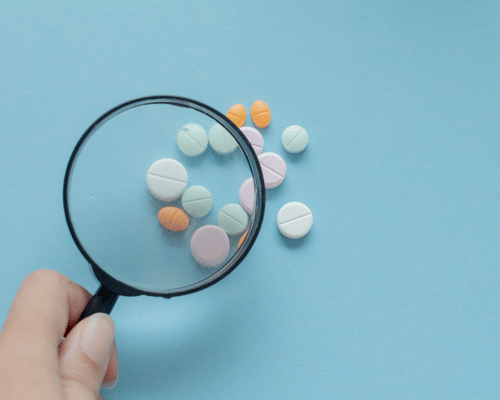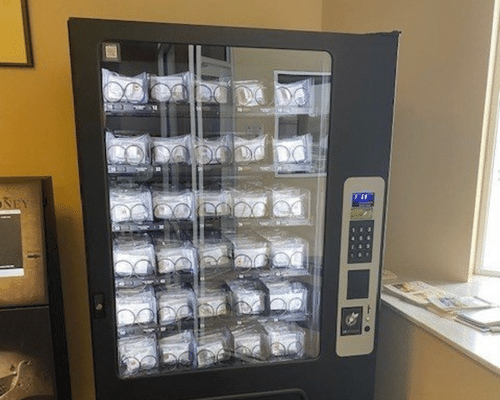Fentanyl fuels drug overdose deaths in Marion County
Drug overdoses have become a leading cause of death in the United States. Opioids are driving the nation’s current drug epidemic. Although fentanyl, a synthetic opioid, has the shortest history in Indiana’s current opioid epidemic, it has already become the leading cause of drug overdose deaths in Indianapolis and Marion County.
Fentanyl represents the third wave of Indiana’s devastating opioid epidemic, which began in the late 1990s with prescription painkillers. Authorities estimate fentanyl entered the drug supply sometime in 2013. This was the same year the heroin epidemic hit Indianapolis.
In 2015, Marion County coroners first noticed fentanyl on a tox screen thought to be a heroin overdose. Instead, the tox screen revealed a straight fentanyl overdose. It wasn’t long before fentanyl began appearing in nearly half of Marion County’s overdoses. Between 2013-2017, fentanyl’s presence in Marion County overdoses increased from 6% to 46%.
Fast forward to 2021, when 85% of Indiana’s total drug overdose deaths (more than 2,700) were due to fentanyl. That’s why it’s important to highlight the different measures being taken in Indiana to limit the number of drug overdoses, especially with fentanyl circulating more and more in the illicit drug supply.
At Landmark Recovery, we help people struggling with opioid addiction get the treatment they need. We try to highlight different measures of harm reduction relative to fentanyl, like carrying naloxone and fentanyl testing strips (FTS), as well as perhaps the greatest threat to people who use drugs (PWUD) – counterfeit pills.
What is fentanyl?
Fentanyl is a synthetic opioid prescribed by doctors to treat extreme pain, particularly in people who recently had surgery. The drug is reported to be 50 times stronger than heroin and 100 times more powerful than morphine, two natural opiates. Fentanyl is known to be manufactured in illegal laboratories.
Drug traffickers have mixed fentanyl with other opioids and stimulants like heroin, making it a cheaper alternative for people who use drugs. Therefore, many opioid users risk buying prescription pills or illegal drugs that may have been laced with fentanyl. When prescribed by a doctor, fentanyl is marketed and sold under names like Actiq®, Duragesic® and Sublimaze®. The smallest amount of this synthetic opioid – reported to be two milligrams or the equivalent of one pill – can be lethal.
Where is fentanyl coming from?
Fentanyl has been traced back to China, Mexico and India. China has been known to be the primary source of this synthetic opioid and related substances. Fentanyl is reportedly trafficked to the United States through international mail and warehouses that handle high-volume deliveries, according to the DEA.
As recently as 2019, one government report said that Mexico had replaced China as the primary source of illegally manufactured fentanyl. That same report claims that Mexican drug cartels and drug traffickers have mixed fentanyl and brand-name prescription medicines like Xanax and Adderall into counterfeit pills.

If you need prescription pills, make sure you’re buying from a licensed pharmacist.
How to identify a counterfeit (fake) pill
Drug traffickers around the United States are distributing fentanyl on the streets disguised as brand-name prescription pills like Percocet or Adderall tablets. Many counterfeit pills resemble M30 pills, varying in color from white to blue. It’s hard to see the difference between counterfeit and prescription pills without a laboratory test.
Drug officials and agencies have advised those needing prescription pills to try following these steps to avoid counterfeit drugs:
- Only buy pills from a licensed pharmacist
- Ask the pharmacist if the pills have the same ingredients as the medicine you’ve been taking
- Ensure the pills are in their original packaging
- Make sure the pill packaging is sealed before you purchase the pills
- Avoid buying pills online or off the street
3 Indiana organizations offering harm reduction services
Like other opioids, repeatedly using fentanyl increases your risk for addiction. At worse, knowingly or unknowingly taking fentanyl by itself or in combination with another opioid can lead to a fatal overdose.
Organizations in and around Indianapolis have also helped Indiana residents avoid overdoses and get the help they need through harm reduction strategies like supplying naloxone and fentanyl testing strips to non-medical personnel. Harm reduction is a range of measures and services to improve overall public health.

Naloxone kits are free via Overdose Lifeline or your local health department’s naloxone distribution program.
Local health department distribution program
Since 2018, more than four million dollars in state and federal funds have been used to provide naloxone to local health departments in Indiana. The state’s naloxone distribution program supplies non-medical personnel with free doses and training. Marion County has participated in the naloxone distribution program for more than five years.
To take advantage of Indiana’s naloxone distribution program, click here and enter your zip code.
Overdose Lifeline
Headquartered on the northside of Indianapolis, Overdose Lifeline is a nonprofit organization advocating for Indianapolis residents affected by addiction. One of the unique harm reduction strategies they’ve implemented is distributing naloxone, the drug used to reverse the effects of an opioid overdose, all over the state of Indiana.
Through a community mental health partnership, Overdose Lifeline has been able to place repurposed vending machines holding up to 300 naloxone kits within various county jails, hospitals and other community sites all over Indiana. Each vending machine is free of charge and open to the public 24/7.

Overdose Alliance has a community partnership to place Naloxone Vending Machines across Indiana.
(source: Dubois County Sheriff Tom Kleinhelter)
Click here to find the closest naloxone distribution center.
Overdose Lifeline also provides fentanyl testing strips (FTS), which can help raise awareness in people who use drugs. Because people often unknowingly take fentanyl, research has shown FTS to be an effective tool for reducing fatal and non-fatal overdoses. One study found people who injected drugs (PWID) to be five times more likely to report changes in their drug use behavior if they had a positive FTS test.
Click here to learn how to get a supply of FTS.
Indiana Addiction Hotline
Indiana residents can dial 211 to access a network of free and confidential information on substance abuse. For more immediate assistance, Indiana residents can also call the Indiana Addiction Hotline at 1-800-622-HELP (4357).
Opioid addiction treatment is the first step to recovery
At Landmark Recovery, we’re committed to saving lives by treating those with an opioid use disorder at our rehab center in northwest Indianapolis.
Ask about the suboxone clinic at Landmark Recovery of Indianapolis. Patients have the option to get a prescription through our outpatient services or to enter residential treatment after completing a 7-10 day detox.
No matter which option you choose, find a treatment provider to help you understand that addiction recovery is possible. If you or someone you know is struggling with abusing opioids or related substances, call 888-448-0302 and one of our addiction specialists can give you more information about treatment.

Choose Recovery Over Addiction
We're here 24/7 to help you get the care you need to live life on your terms, without drugs or alcohol. Talk to our recovery specialists today and learn about our integrated treatment programs.



